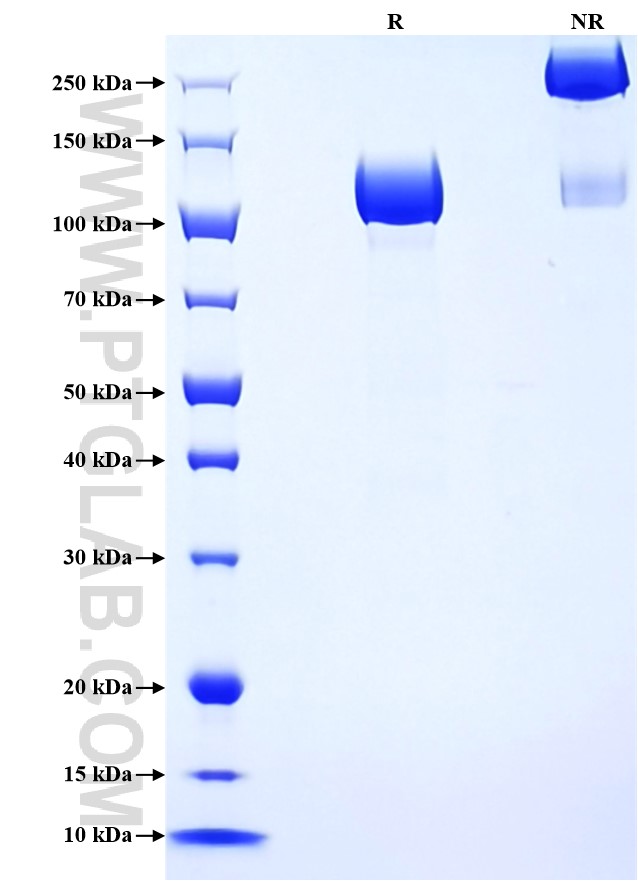Recombinant Mouse ACE2 protein (rFc Tag)
种属
Mouse
纯度
>90 %, SDS-PAGE
标签
rFc Tag
生物活性
未测试
验证数据展示
产品信息
| 纯度 | >90 %, SDS-PAGE |
| 内毒素 | <0.1 EU/μg protein, LAL method |
| 生物活性 |
Not tested |
| 来源 | HEK293-derived Mouse ACE2 protein Gln18-Thr740 (Accession# Q8R0I0-1) with a rabbit IgG Fc tag at the C-terminus. |
| 基因ID | 70008 |
| 蛋白编号 | Q8R0I0-1 |
| 预测分子量 | 109.5 kDa |
| SDS-PAGE | 110-130 kDa, reducing (R) conditions |
| 组分 | Lyophilized from 0.22 μm filtered solution in PBS, pH 7.4. Normally 5% trehalose and 5% mannitol are added as protectants before lyophilization. |
| 复溶 | Briefly centrifuge the tube before opening. Reconstitute at 0.1-0.5 mg/mL in sterile water. |
| 储存条件 |
It is recommended that the protein be aliquoted for optimal storage. Avoid repeated freeze-thaw cycles.
|
| 运输条件 | The product is shipped at ambient temperature. Upon receipt, store it immediately at the recommended temperature. |
背景信息
ACE2 (Angiotensin-converting enzyme 2), also named as ACEH, is a zinc metalloprotease of the ACE family and a critical regulator of the reninangiotensin system. ACE2 has a more restricted tissue distribution than ACE, being found predominantly in the heart, kidneys, and testes although low levels have been detected in a variety of tissues. ACE2 has been shown to be a functional receptor of the human coronaviruses SARS-CoV and SARS-CoV-2. The expression level and expression pattern of human ACE2 in different tissues might be critical for the susceptibility, symptoms, and outcome of 2019-nCoV/SARS-CoV-2 infection. It can be used as a potential therapeutic target of SARS-CoV-2.
参考文献:
1. Lambert DW, et al. (2005) J Biol Chem. 280(34):30113-9. 2. Hoffmann M, et al. (2020) Cell. 181(2):271-280.e8. 3. Cao Y, et al. (2020) Cell Discov. 6:11. 4. Zhang H, et al. (2020) Intensive Care Med. 46(4):586-590. 5. Warner FJ, et al. (2005) J Biol Chem. 280(47):39353-62.
